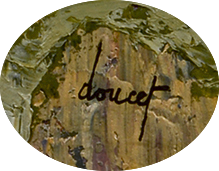

(Boulogne-sur-Seine, 1924 - Paris, 1994)

As a teenager, Jacques Doucet discovered a passion for writing poetry and drawing.
In 1942, he went to Saint-Benoît sur-Loire to meet the poet Max Jacob, who encouraged him to develop his artistic talents while leaving him to choose his own creative path. Doucet began to paint and exhibited at the Salon d'Automne in 1943 and 1944.
During the Occupation, he became politically active but was denounced and arrested by the Vichy militia. Imprisoned in the Prison de la Santé, his works were confiscated. This period of imprisonment had a profound effect on his sensitivity and influenced his pictorial universe.
After the Liberation, he resumed his artistic activity and participated in the Salon des Surindépendants in 1945 and 1946.
In Paris, he met a Hungarian collector who invited him to stay in Budapest with the Dutch painter Corneille, with whom he shared a common interest in the Hungarian Surrealists and the art of free expression of this movement. Together they discovered the work of Klee, and became enthusiastic about gypsy music and Hungarian folk art.
On his return to Paris, he joined the Groupe Surréaliste Révolutionnaire, while Corneille, in Amsterdam, founded the CoBrA movement with Constant and Appel and published the first issue of their journal Reflex.
After the dissolution of the Groupe Surréaliste Révolutionnaire, Doucet joined the CoBra movement with Atlan, becoming the two French representatives. Michel Ragon, writer and art critic, became the editor of this French representation, succeeding Édouard Jaguer. Atlan and Doucet participated in all CoBrA events, including the first exhibition of Experimental Art at the Stedelijk Museum in Amsterdam in 1949 and the last exhibition in Liège in 1951.
Out of friendship, Appel and Corneille ask Doucet to illustrate the second and last issue of Reflex.